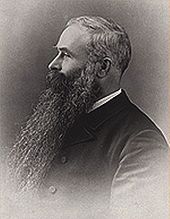Louis-Olivier Taillon
Sir Louis-Olivier Taillon , PC , QC (born September 26, 1840 in Terrebonne , † April 25, 1923 in Montreal ) was a Canadian politician . He was the eighth prime minister of the province of Québec and ruled twice. His first term of office lasted only four days, from January 25 to 29, 1887. The second time he ruled from December 16, 1892 to May 11, 1896. From 1887 to 1896 he was chairman of the Parti conservateur du Québec . In 1896 he was a member of the federal government for a little over two months.
biography
Taillon, the son of a farmer, graduated from the Collège Masson in Terrebonne. After graduating from school, he originally wanted to become a priest and taught at his former school from 1856 to 1862 until he changed his mind and embarked on a legal career. In 1865 he was admitted as a lawyer and practiced as a partner of several prominent lawyers, including Lomer Gouin . Taillon, a supporter of ultramontanism , was co-author of the party program of the Parti conservateur du Québec , which was strongly influenced by Roman Catholic moral teaching . He also advised the Montreal Bishop Ignace Bourget on disputes with liberal Catholics.
In 1875 Taillon ran for the Québec National Assembly and was successful in the constituency of Montréal-Est. He supported the government of Charles-Eugène Boucher de Boucherville and campaigned for his ultramontane concerns in parliament. Boucherville's successor, Joseph-Adolphe Chapleau , appointed Taillon spokesman for the National Assembly in March 1882 , who held this office until March 1884. From January 1884 he was Attorney General under John Jones Ross . Taillon and Ross advocated the execution of the Métis rebel leader Louis Riel , which led to violent protests in ultramontane circles within the party.
The liberal Honoré Mercier took advantage of popular outrage and won the election in October 1886. Taillon lost his seat, but was re-elected two months later in the Montcalm constituency. Under pressure from the federal government, Ross stayed in office for a few months in order not to let the liberals come to the provincial government before the general election. Eventually he had to give in to internal party pressure and resign as Prime Minister on January 25, 1887. But even Taillon, who was appointed the new prime minister and party leader, could not find enough support, so that the new government broke up after just four days.
Taillon turned down an offered judge post and preferred the role of opposition leader. The Chaleur Bay scandal forced Mercier to resign in December 1891, after which the Conservatives under Boucherville came back to power. In the new government, Taillon was a Minister without Portfolio . Boucherville resigned on December 16, 1892, because he did not want to work under Lieutenant Governor Joseph-Adolphe Chapleau , whereupon Taillon was commissioned to form a government. He appeared more as an administrator than as a political leader and pursued a tough austerity course. From October 1894 he also served as the provincial treasurer.
On May 11, 1896, Taillon handed over the office of government to Edmund James Flynn . The reason for this was Charles Tupper's appointment to the federal cabinet ten days earlier . In this he was head of the Postal Ministry. The Conservatives lost the general election in 1896 and Taillon was not elected in the Chambly-Verchères constituency, which is why he had to resign from his ministerial post on July 8th. Although he never ran again in elections, he continued to support the Conservatives in public appearances. He died in 1923 and was buried in the Notre-Dame-des-Neiges cemetery in Montreal.
Web links
- Louis-Olivier Taillon . In: Dictionary of Canadian Biography . 24 volumes, 1966–2018. University of Toronto Press, Toronto ( English , French ).
- Biography on the Québec National Assembly website (French)
| personal data | |
|---|---|
| SURNAME | Taillon, Louis-Olivier |
| BRIEF DESCRIPTION | Canadian politician |
| DATE OF BIRTH | September 26, 1840 |
| PLACE OF BIRTH | Terrebonne |
| DATE OF DEATH | April 25, 1923 |
| Place of death | Montreal |

